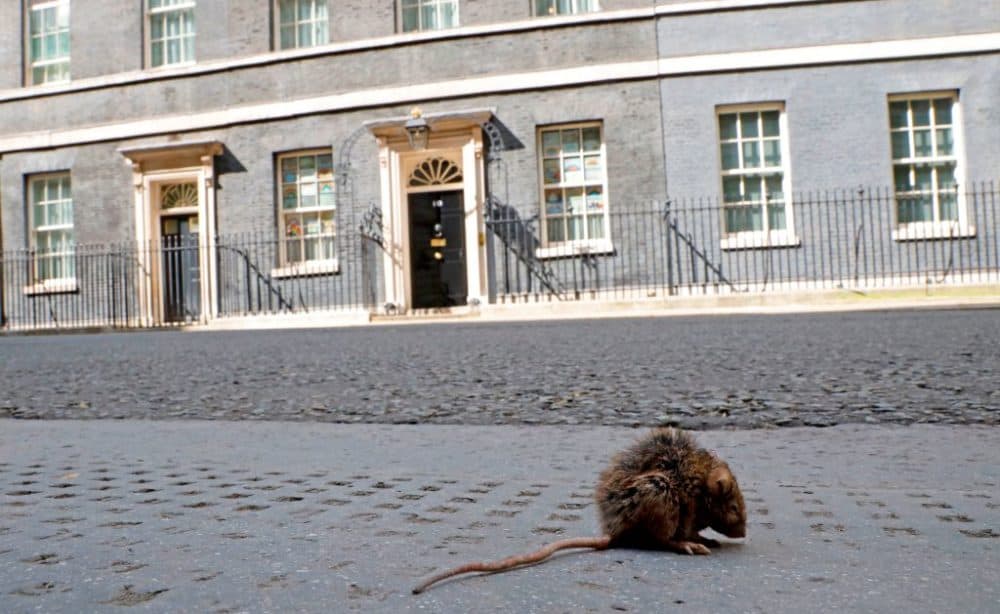Advertisement
Rats Adapt To A World In Pandemic Mode
Resume
Humans aren’t the only ones impacted by coronavirus-induced shortages. Just ask your friendly neighborhood pack of rats.
Closed restaurants mean empty dumpsters, creating a food shortage for many of these nighttime scavengers. As human habits have changed in the face of the pandemic, rats have to adapt.
Perhaps “friendly” isn’t quite the right word. Rats are survivors, says exterminator Robert Villamil. They will do what is necessary to avoid starvation. That means fighting, and sometimes even eating, other rats.
Villamil, who owns Crow Pest Control in Chicago, says rats have become more brazen as they’re forced to look farther and longer for food. The lack of restaurant scraps has pushed their search into residential areas, where trash cans are fuller than ever.
Last month, Washington Post Opinions editor Meghan Kruger found several rats around her trash cans, where she’d never seen them before. A few days later, NPR Congressional correspondent Kelsey Snell tweeted that her car was running funny. Lo and behold, her mechanic found rats in the engine. The tweet prompted a New York Times story that urged readers to look for signs of infestation in their cars. Here & Now’s Robin Young herself never had rats in her backyard before, until she found them feasting on her birdseed.
But there are ways to avoid being next on this list of unsuspecting victims. Villamil says the key is to be proactive.
“There are a lot of things people can do to help discourage rats from coming, to make it unfriendly for them,” he says. “If we do that, then the chances of getting rid of the rats or slowing them down are high.”
Villamil recommends people be careful with their waste. Turn compost regularly and spray food scraps with water to dull the smell, he says. Power washing trash cans every so often is also a way to curb rats’ ability to sniff out your garbage, and it’s important to properly clean up after pets — rats love the smell of dog poop, Villamil says.
Rats are also attracted to gardens, he says, but there are ways to make them less rat friendly too. Herbs such as rosemary, lavender and peppermint can ward off rodents. Still, be sure not to let fresh vegetables lay on the ground where pests can easily snatch them up.
It’s important to remember that rats aren’t like other animals, Villamil says. Experts say rat infestations are more than unsightly, they’re a public health concern. Though it’s not yet clear whether they can pass on COVID-19, they are known to carry salmonella and other gastrointestinal illnesses that can be passed on to humans.
Rats can also drive up your home maintenance bills, says Villamil.
“They cause millions of dollars in damage,” he says. Rats chew wiring in cars and homes that can render the engine useless or even start a fire. Their incessant instinct to gnaw can leave a home in tatters.
But when killing the pests, though rat poison is effective, it’s also dangerous. It can kill just about any animal, including predators such as foxes and hawks, which can create even larger rodent problems in the future. Even more dire, the Environmental Protection Agency estimates that poison control responds to around 10,000 rat poison-related calls for children every year, according to Scientific American Magazine.
One proposed alternative is using dry ice to suffocate the rodents, which Chicago tried in 2017, but Villamil says more testing needs to be done to ensure the method’s safety.
For now, wash your trash cans, grow some lavender and stay vigilant.
Lynsey Jeffery produced and edited this interview for broadcast with Tinku Ray. Jeffery also adapted it for the web.
This segment aired on May 18, 2020.